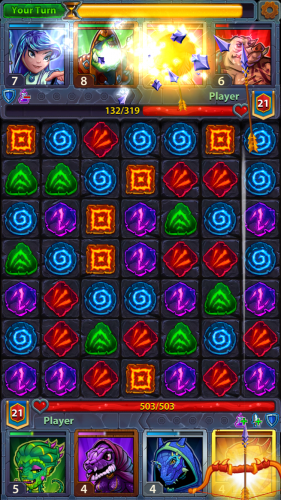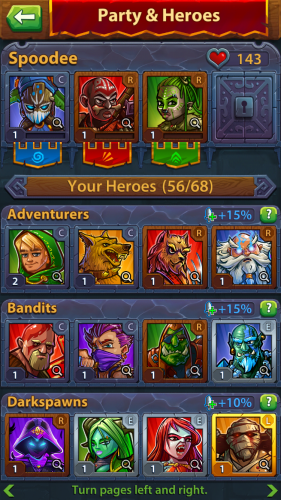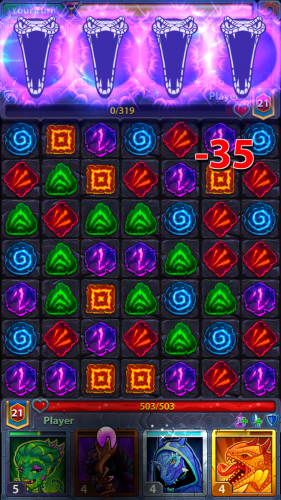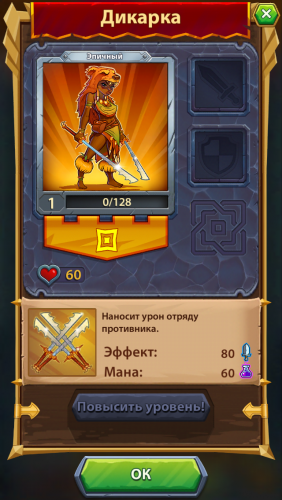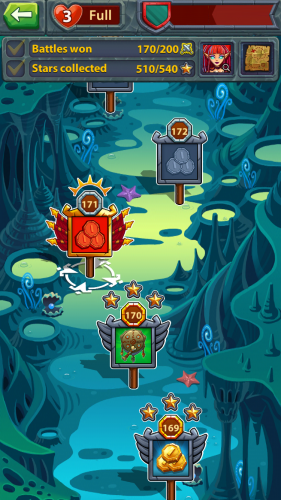About the new Russian battler Heroes and Puzzles, which was promoted by Apple in the Russian and Canadian iTunes in early June, we talked with its developers from Ufa – the LingPlay team.
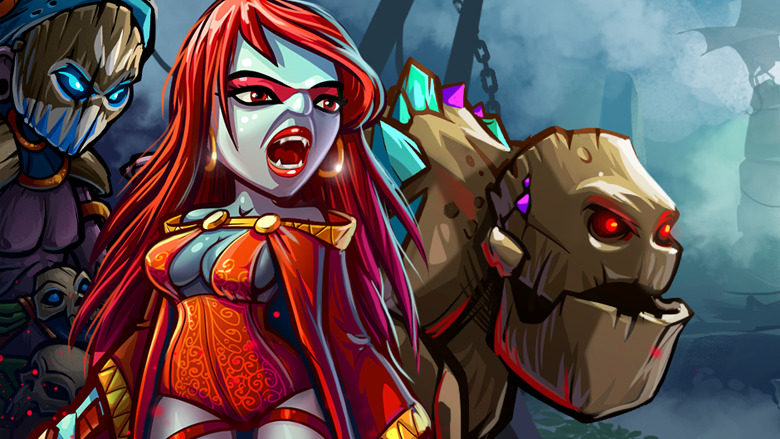
Our questions were answered by the producer of the company Sergey Arapov.

Sergey Arapov
Hi! Why did you take up match-3?
Hi! Match-3 is one of the most versatile mechanics at its core, it is intuitive and has a zero entry threshold.
But the usual three-in-a-row was not enough for us, and among the “pure” match-3 it was very crowded on the market, so it was immediately decided to make a hybrid of this popular genre and role-playing game. Several publishers expressed interest in the project at the time of launch.
A big role [in choosing the genre] was also played by the fact that our external producer Roman Povolotsky has a lot of successful experience in developing match-3 with a developed metagame, and before joining LingPlay I worked on games for social networks (including match-3, a project based on PvP mode).
In Heroes and Puzzles, the match-3 mechanics are responsible for the battle, and the rest of the “body kit” – by analogy with rogue-lite – can be called RPG-lite.
Now the market is jaded with games in the genre of three-in-a-row (including midcore), aren’t you afraid that soon this genre will simply get bored with the public?
All people will never become gamers who need more complex and serious games.
Here we can draw the following analogy. Everyone is constantly listening to music and watching movies and TV shows, but only a small group of people become music lovers and movie fans.
So, I believe that match-3 will always have an audience.
In addition, smartphones are becoming more affordable, and more and more people are acquiring them. This increases the number of casual players.
In parallel with this, the following process occurs: some users who have been playing for a long time, get tired of the simplest games, become ready to play something a little more serious (but not hardcore).
This is the audience we are targeting, the players on the border between casual and midcore groups. An enthusiastic casual will not suffer in our game, he will be comfortable and interesting. A midcore player who decides to relax in Heroes and Puzzles (or even a hardcore player) will also find opportunities to find the perfect path, paying attention to the variability of tactical decisions focused primarily in the metagame.
It is clear that this is an audience with a non-permanent composition: some will return back to casual games, not wanting to spend time and effort on more complex games, some will go further – to pure midcore and even hardcore, but some will remain at this level. Plus, the influx of casual players from among the “growing up” will continue. So there is simply no permanent audience that the match-3 RPG genre can suddenly get bored with. Despite the constant turnover, our audience will be a more or less constant and steadily increasing group.
Most of the battlers are often overcomplicated and confused for a casual player. On the one hand, they have a high entry threshold. On the other hand, many of them cannot offer something really strategic for hardcore players. We deliberately do not focus on hardcore fans and try to be as clear and transparent as possible, but at the same time remain simple, but still a full-fledged role-playing game.
How long have you been working on the project and in what composition?
Work on the game was carried out with some slack for a little more than a year. Most of the time, 3 programmers, 2 artists, an animator and a game designer, 2 testers, a project manager, an internal producer and an external consultant were engaged in development.
If it’s not a secret, then where does the money for development come from (outsourcing, old savings, investor)?
Both, and the other, and the third. Our company has a rather unusual history for indie developers.
In 2011, the mobile gaming industry reached such a scale that it was on everyone’s ear: various success stories were widely spread.
The discussion of this direction constantly arose in communication with business partners from the brothers Almaz and Azat Maksyutov. At the same time, everyone except them considered this area too costly and risky. But despite this skepticism, the brothers set themselves a goal – to create a company in Ufa with such conditions and opportunities for employees that it will be able to create interesting products and successfully compete in the international mobile games market.
It is thanks to the faith of the Maksyutov brothers in the gaming industry and their ambitions to create an effective gaming company in the Russian province, an unknown team with minimal profile experience was able to create and publish together with Kongregate an eventful runner Sheep Happens, which received several features on iOS and Android and was liked by a huge number of players. The money earned on it went, among other things, to the development of Heroes and Puzzles. In addition, we received additional funds by performing outsourcing work for Russian and European companies.
What difficulties were there during development, and how were they solved?
Most of the difficulties were due to the fact that Heroes and Puzzles is a larger and more complex project than what we did before. Due to lack of experience, they underestimated the complexity of the implementation of some parts and presumptuously set themselves a level higher than they could take without any problems.
For example, initially we decided to make a game with both offline and online activities. This created a lot of intractable technical problems and increased development time, but ultimately became one of the trump cards of the game and a way to attract players through search queries.
Because of this, we decided to work out both the single campaign and the PvP mode on the same scale. This also increased the development time, but in the end allowed to satisfy most of the users.
Also, during pre-production and prototyping, the complexity of individual mechanics for players was underestimated, as a result of which, during production, part of the already implemented developments went under the knife.
A lot of resources were spent on the visual part of the game. For art, we initially set the bar higher than for similar projects. And we try to be uncompromising in the quality of art and animations, as much as possible. Therefore, if something turns out to be not good enough by our standards, we redo and refine it until the result meets our requirements.
All these problems were solved on their own and they had to pay for them with a longer development period than originally planned.
After the appearance of a playable demo version, we were faced with the fact that publishers, from whom, before the launch of production, an agreement in principle was obtained to publish a project in this genre, managed to lose interest in it, because during the development of the publishing hype switched from match-3 RPG to games in the spirit of Clash Royale. Therefore, the technical launch and softlonch were carried out independently, having gained relevant experience and strengthened their positions in communicating with publishers.
The most important thing is that we have sorted out all the mistakes and made all the necessary conclusions.
My favorite question (and as far as I know, one of the most popular) is on what principle do the chips fall out?
Since we don’t have a “pure” match-3 game and besides with a full-fledged PvP mode, we initially decided not to manipulate the player by controlling the drop of chips. Therefore, new chips are generated randomly, but with the restriction that there should be no ready-made combinations in the drop-down arrays.
We build a balance not on the field of chips and managing their loss, but in the role-playing add-on. In fact, collecting combinations in our game is analogous to throwing dice in tabletop role-playing games, which determines the degree of success of an action (in our case, progress in charging the abilities of heroes, which are activated automatically after charging).
At the same time, we can thoughtlessly make chips three in a row, killing time in a relaxed way, but for efficiency and confident progress, you need to take into account the colors of your heroes, their abilities, which of them is already charged, the colors of the enemy’s heroes and their current charge.
But – an important point – the player needs to take actions only within the field. That is why the heroes’ abilities are triggered automatically, without direct activation by the player – so that the player is focused only on collecting combinations, and the game does not become too difficult. We have prototyped manual activation: it made the game more tactical, but also more challenging. She took us away from the post-casual audience towards midcore hardcore, where we are not ready to go yet, and where the match-3 mechanics itself looks frivolous.
Does the difficulty in the game change dynamically depending on the player’s successes /failures on the battlefield?
No, we refused such manipulations. In the battles of “Adventure” (single campaign) there is no control over the loss of chips, the behavior and “mind” of the bot do not change, we have a linear increase in complexity, balanced on the planned progress of the player’s heroes and the availability of items.
Even the bot that the player fights in the “Adventure” does not know which chips will fall to him or the player. But he analyzes the field very well, the presence of certain combinations of different colors – both for his heroes and the player’s heroes – and is able to make not the most obvious, but effective moves. On the depth of analysis and understanding of tactical nuances, the setting of the “mind” of the bot is built, which becomes more and more insightful in the course of the “Adventure”.
My experience of playing Heroes and Puzzles cannot be called great (about 20 missions), but I noticed that you decided not to diversify the gameplay. If in other three-in-a-row, developers often try to offer additional features within the mechanics (these may be obstacles, ice, chocolate, and so on). You refused it. Why?
Because the main emphasis in the game is on the role-playing add-on. Collecting chips is just a randomizer that takes into account the luck and skill of the player – attentiveness, the ability to calculate precipitation, effectively choose the color of the collected chips depending on the current situation in battle and on the field.
Our game is not about solving puzzles by collecting chips, as in most match-3 games, but about how to charge your heroes by collecting combinations, activate their abilities in the right order, and not let the enemy be effective. Well, in the metagame – how to assemble the optimal squad from the available heroes, taking into account the task at hand, what equipment to hang on your fighters, in what modes and how much to play, what to do with insufficiently strong items, how to get new heroes and equipment.
We have a simple, but full-fledged role-playing game in which the fight is implemented through the understandable and familiar mechanics of match-3.
The game is a battler. At the same time, you do not have a classic card system. What was the reason for the decision, what did you replace this body kit with, tell us about his work?
Since we did not want to make a similarity or imitation, but only a simplified role-playing game, we initially abandoned the traditional multi-stage fusion and evolution in favor of role-playing mechanics.
We have leveling heroes by levels by gaining experience tied to the amount of damage inflicted by the squad as a whole. To increase the effectiveness of the squad, the player needs to deal with equipment management: get items in one way or another, equip heroes with them, engage in reforging items (MMO “sharpening”).
We are trying to turn collecting the heroes themselves from a hobby into a mechanic: now a player can get an additional bonus by forming a squad from a full set of heroes, and in the near future we want to make the bonuses from the collected set permanent – so it will make sense for players to collect all the heroes without exception, and not focus only on a part of the favorites.
To increase the attractiveness of the PvP mode, which is designed to increase the retention time of players, even if they have passed all currently available Adventure zones, in the latest update we added a Clash Royale-inspired system of chests received for Arena victories. Of these, players get items and heroes for free, but with a time delay or immediately, but for coins.
Well, the most important thing is that we still plan to make them spray instead of selling items and add the evolution of items and heroes (moving to the category above). But they will work not through collecting the necessary additional items or heroes (in our game, re-obtaining a hero gives a level-up, and identical items are unique), but through spending dust and coins (or in-app purchase, if the player does not want to waste time accumulating resources).
This mechanic will work perfectly in combination with collecting, chests and spraying and the evolution of items. Plus, players will be able to keep their favorite heroes relevant.
The mechanics of many battlers, like Heroes Charge, are largely based on the work of characters with each other, on their specializations and synergy. As far as I understand, you decided to go a different way. Tell us about how the work with the characters is built in the game.
Exactly the same. Designing the hero system, we initially focused on typical MMORPG roles – we have damagers, tanks, buffers, debuffers and their subtypes. It’s just that we don’t present it in such a literal way so as not to scare away our players, who are most likely unfamiliar with MMO concepts, and first of all, we give the player heroes-damagers whose abilities are understandable and give obvious benefits without additional conditions. We reveal the other abilities of the heroes gradually, so as not to load the player, giving him time to get used to the game and realize the effect of abilities without damage one by one.
Here, as in other battlers, it is necessary to learn how to combine heroes with different abilities among themselves, to form the optimal squad for a particular task. That is, we have such a concept as a build, which is just based on the specializations of heroes and their synergy among themselves.
In addition, in different modes, combinations of heroes of different specializations are needed: for simple victories in the “Adventure” – some, for passing 3-star battles in it – others, for battles with Big bosses – the third, for PvP – the fourth. This ensures the demand for heroes of all types. Judging by the reviews, not all players understand this feature of the game on the go, but this is exactly the part of the game in which its fans who are thoroughly hooked on it are progressing.
Well, with many battlers, we are related to the relevance and understanding of such a popularized Hearthstone concept as “tempo”, the conditional meaning of which is just derived from the features of the current player build.
I want to ask about the features of development in Ufa: what are the difficulties, what are the advantages of working in it?
By definition, the mobile market is international, if you do not consciously limit yourself with an eye to individual countries or parts of the world. Obviously, because of this, you can develop games almost anywhere. Ufa in this regard is a very convenient city with a million people with a developed infrastructure, but cheaper and less spoiled than the capital.
Difficulties are associated with only three things: a limited supply of qualified personnel with specialized experience, significant expenses for business trips and the difference in time zones, which is especially felt in working with foreign partners.
However, despite the location in Ufa, LingPlay initially did not limit itself only to shots from the capital of Bashkortostan. There were a lot of people from other cities in our team, especially from Moscow. And also more than once we were lucky to attract people from Ufa who had already worked in game development, as well as to cultivate cool specialists from enthusiasts without specialized experience.
The remaining problems are solved by a sober assessment of the effectiveness of participation in an event, as well as competent organization of work with partners.
The first game of the company – runner Sheep Happens – was published with Kongregate, why are you publishing the second project yourself now?
Everything has its place and time. Of course, we negotiated with Kongregate regarding Heroes and Puzzles and received useful feedback from them, but this project did not fit into their current product line, and they saw no point in retreating from the planned path of their development. At the same time, we continue to communicate with representatives of Kongregate and are considering opportunities to work together on our other projects.
Having failed to find a publisher with conditions satisfying us before receiving metrics (although there were a lot of offers at late stages), we decided to make a technical launch of Heroes and Puzzles on Android on our own. In this case, Nekki, represented by its Vice President for Development Sergey Babayev, helped us a lot with test traffic.
Following the results of the technical launch, we finalized and expanded the game, and, rejecting several new offers, in May we entered the softlonch on both Android and iOS. On both platforms, we conducted a number of marketing experiments at our own expense, gained experience in promoting in stores and were satisfied with the result, thanks to which we took first or second place in the “New” sections of the “Puzzles” and “Role-playing Games” game categories.
In early June, the game appeared in the “New Products of the Week” on the first page in the Russian and Canadian Apple App Store. Heroes and Puzzle became the second game from Ufa, which received in one form or another a feature from Apple, continuing the tradition laid down by our Sheep Happens, which we are very proud of.
Now we continue to actively work on expanding the functionality and content of the game, we are negotiating with several partners on various types of cooperation and are trying to do everything possible so that Heroes and Puzzles repeatedly surpasses the achievements of Sheep Happens and provides opportunities for LingPlay to flourish for many years and for our team to create more ambitious and successful games.
Thanks for the interview!

